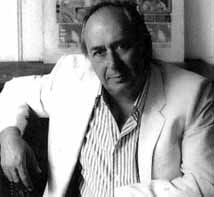
J. G. Ballard
James Graham Ballard (15 November 1930 – 19 April 2009)[2] was an English novelist and short story writer, satirist and essayist known for psychologically provocative works of fiction that explore the relations between human psychology, technology, sex and mass media.[3] Ballard first became associated with New Wave science fiction for post-apocalyptic novels such as The Drowned World (1962), but later courted political controversy with the short-story collection The Atrocity Exhibition (1970), which includes the story "Why I Want to Fuck Ronald Reagan" (1968) and the novel Crash (1973), a story about car-crash fetishists.
J. G. Ballard
James Graham Ballard
15 November 1930
Shanghai International Settlement, Republic of China
(present-day Shanghai, People's Republic of China)
19 April 2009 (aged 78)
London, England, UK
Novelist, satirist, short story writer, essayist
3, including Bea Ballard
In 1984, Ballard won broad critical recognition for the war novel Empire of the Sun, a semi-autobiographical story of the experiences of a British boy during the Japanese occupation of Shanghai;[4] three years later, the American film director Steven Spielberg adapted the novel into a film of the same name. The novelist's journey from youth to mid-age is chronicled, with fictional inflections, in The Kindness of Women (1991), and in the autobiography Miracles of Life (2008). Some of Ballard's early novels have been adapted as films, including Crash (1996), directed by David Cronenberg, and High-Rise (2015), directed by Ben Wheatley, an adaptation of the 1975 novel.
From the distinct nature of the literary fiction of J. G. Ballard arose the adjective Ballardian, defined as: "resembling or suggestive of the conditions described in J. G. Ballard's novels and stories, especially dystopian modernity, bleak man-made landscapes, and the psychological effects of technological, social or environmental developments".[5] The Oxford Dictionary of National Biography describes the novelist Ballard as preoccupied with "Eros, Thanatos, mass media and emergent technologies".[6]
Life[edit]
Shanghai[edit]
J. G. Ballard was born to Edna Johnstone (1905–1998)[6] and James Graham Ballard (1901–1966), who was a chemist at the Calico Printers' Association, a textile company in the city of Manchester, and later became the chairman and managing director of the China Printing and Finishing Company, the Association's subsidiary company in Shanghai.[6] The China in which Ballard was born featured the Shanghai International Settlement, where Western foreigners "lived an American style of life".[7] At school age, Ballard attended the Cathedral School of the Holy Trinity Church, Shanghai.[8] Upon the outbreak of the Second Sino-Japanese War (1937–1945), the Ballard family abandoned their suburban house, and moved to a house in the city centre of Shanghai to avoid the warfare between the Chinese defenders and the Japanese invaders.
After the Battle of Hong Kong (8–25 December 1941), the Imperial Japanese Army occupied the International Settlement and imprisoned the Allied civilians in early 1943. The Ballard family were sent to the Lunghua Civilian Assembly Centre where they lived in G-block, a two-storey residence for 40 families, for the remainder of the Second World War. At the Lunghua Centre, Ballard attended school, where the teachers were prisoners with a profession. In the autobiography Miracles of Life, Ballard said that those experiences of displacement and imprisonment were the thematic bases of the novel Empire of the Sun.[9][10]
Concerning the violence found in Ballard's fiction,[11][12] the novelist Martin Amis said that Empire of the Sun "gives shape to what shaped him."[13] About his experiences of the Japanese war in China, Ballard said: "I don't think you can go through the experience of war without one's perceptions of the world being forever changed. The reassuring stage-set that everyday reality in the suburban West presents to us is torn down; you see the ragged scaffolding, and then you see the truth beyond that, and it can be a frightening experience."[12] "I have — I won't say happy — [but] not unpleasant memories of the camp... I remember a lot of the casual brutality and beatings-up that went on — but, at the same time, we children were playing a hundred and one games all the time!"[7] In his later life, Ballard became an atheist, yet said: "I'm extremely interested in religion ... I see religion as a key to all sorts of mysteries that surround the human consciousness."[14]
Britain and Canada[edit]
In late 1945, Ballard's mother returned to Britain with J.G. and his sister, where they resided at Plymouth, and he attended The Leys School in Cambridge,[15] where he won a prize for a well-written essay.[16] Within a few years, Mrs Ballard and her daughter returned to China and rejoined Mr Ballard; and, whilst not at school, Ballard resided with grandparents. In 1949, he studied medicine at King's College, Cambridge, with the intention of becoming a psychiatrist.[17]
Television[edit]
On 13 December 1965, BBC Two screened an adaptation of the short story "Thirteen to Centaurus" directed by Peter Potter. The one-hour drama formed part of the first season of Out of the Unknown and starred Donald Houston as Dr. Francis and James Hunter as Abel Granger.[65] In 2003, Ballard's short story "The Enormous Space" (first published in the science fiction magazine Interzone in 1989, subsequently printed in the collection of Ballard's short stories War Fever) was adapted into an hour-long television film for the BBC entitled Home by Richard Curson Smith, who also directed it. The plot follows a middle-class man who chooses to abandon the outside world and restrict himself to his house, becoming a hermit.
Articles, reviews and essays
Source material
Obituaries and remembrances